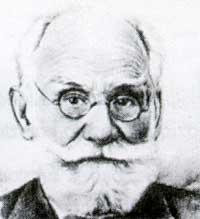Pavlov, Ivan Petrovitx
(1849-1936)
This prestigious Russian physiologist was born in Ryazan in 1849. As in his family there were many priests, they tried to encourage young Ivan to religious studies. During his training at the Seminar, assistance to the natural sciences was highlighted. He left the seminary and in 1870 entered the University of St. Petersburg, where he had as professors Mendeleiev and Butlerov. He graduated from the Military School of Medicine in 1883 and completed his higher education in Germany until 1886.
Pavlov was a passionate worker, a very intuitive person, a hard-working observer and an incredible memory. Some of his followers claimed that to cultivate memory he learned the names of butterflies and herbs, and during his life he did a great job of collecting.

Before Pavloven, the study of physiology was carried out in parts, but this method made it impossible to study the dynamic activity of physiological processes. Pavlove created a method called "chronic experiment": the investigations were carried out for a long time in uninjured or preoperated animals. Thus he created a new science: synthesized physiology or physiology of the whole organism.
Since 1878 Pavlove completed studies of the physiology of blood circulation and digestion and reflex theories. He addressed the study of organs and systems based on the tasks of the nervous system. Thanks to this principle he studied the brain, center of the nervous system.
The main works of the time are related to the centripetal nerves of the heart. He discovered the precise nerve that accentuates cardiac contractions. He also confirmed that organ and tissue trophism was in nervous regulation.
On the other hand, he suspected that the lungs contain antigenic substances. After many years, the discovery of Pavloven was confirmed. From the lungs came heparin, widely used today against thrombosis.
On the other hand, his contribution to science was important, since the discovery of a certain type of liserial enzymes began a new vision of enzymology.
XX. At the beginning of the 20th century Pavlov devoted himself to brain research. Until then only unconditioned reflexes in physiology were analyzed, since the conditioned ones were attended by psychologists. Pavlov was the one who turned conditioned reflection into a method of scientific knowledge.
He presented his report on conditioned reflexes at the International Congress of Medicine held in Madrid in 1903. His speech provoked the sensation produced by the explosion of a bomb, since they did not understand how the psyche could be studied by physiological methods. Pavlov for many years studied the characteristics of conditioned reflexes and claimed that this reflex is the basic principle of brain function.
Pavloven's contribution is enormous. In 1904 he was awarded the Nobel Prize, being the first scientist to receive it. He was part of twenty scientific academies and was named honorary member of various scientific societies.
It was held in 1935. At the Congress of Physiology he was appointed "dean of physiologists of the world".
In 1936 he went to St. Petersburg.
Buletina
Bidali zure helbide elektronikoa eta jaso asteroko buletina zure sarrera-ontzian











